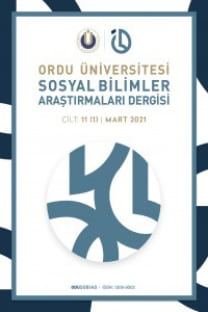Türkiye Üzerinde Yoksullaştıran Büyüme Hipotezinin Analizi: 1970-2020
İhracata dayalı büyüme modeli izleyen ülkelerin dış ticaret hadlerinde bozulmalar meydana gelebilmektedir. Dış ticaret hadlerinin bozulması, zamanla ihracat gelirlerinin düşmesine ve toplumun refah düzeyinin düşmesine sebep olabilmektedir. Literatürde bu kavram “Yoksullaştıran Büyüme” olarak ele alınmaktadır. Bu çalışmanın amacı, Türkiye’nin 50 yıllık dış ticaret verilerini inceleyerek dış ticaret açığı, ithalat ve dış ticaret hadleri arasında nasıl bir ilişki olduğunu görmektir. Çalışmada 1970-2020 yılları arasındaki dönem yoksullaştıran büyüme çerçevesinde araştırılmıştır. Yapılan ekonometrik analizde ihracat, dış ticaret hadleri ve dış ticaret açığı değişkenleri kullanılmıştır. Söz konusu dönemde yaşanan ekonomik krizler, politika değişiklikleri, yapısal farklılıklar göz önüne alınarak yapısal kırılmalı modeller ele alınmıştır. Bu bağlamda, Türkiye’nin 50 yıllık dış ticaret performansının yoksullaştıran büyüme üzerindeki etkisi incelenmiştir. Elde edilen bulgular doğrultusunda, Türkiye ekonomisi için ihracat artışlarının, dış ticaret hadlerini aşağı çekerek dış ticaret açığını arttırdığı anlaşılmaktadır. Bu sonuç Türkiye’de yoksullaştıran büyüme hipotezinin geçerli olduğu konusunda önemli bir kanıt olarak değerlendirilebilir. Çalışmada dış ticaret hadlerinde bozulmalar olduğu, dolayısıyla Türkiye özelinde yoksullaştıran büyümenin varlığı seçili dönem aralığında geçerli olduğu tespit edilmiştir.
Anahtar Kelimeler:
Yoksullaştıran Büyüme, Dış Ticaret Haddi, İhracat, İthalat, Türkiye, Immiserizing Growth, Terms of Trade, Exports, Imports, Turkey
Analysis of the Immiserizing Growth Hypothesis on Turkey: 1970-2020
There may be deterioration in the terms of trade of the countries following the export-led growth model. The deterioration of the terms of trade may cause a decrease in export revenues and a decrease in the welfare level of the society over time. In the literature, this concept is discussed as “Immiserizing Growth”. The aim of this study is to examine Turkey's 50-year foreign trade data and see how there is a relationship between foreign trade deficit, imports and terms of trade. In the study, the period between 1970 and 2020 was investigated within the framework of immiserizing growth. Export, terms of trade and foreign trade deficit variables were used in the econometric analysis. Considering the economic crises, policy changes, and structural differences in the period in question, models with structural breaks are discussed. In this context, the effect of Turkey's 50-year foreign trade performance on immiserizing growth has been examined. In line with the findings, it is understood that the increase in exports for the Turkish economy increases the foreign trade deficit by lowering the terms of trade. This result can be considered as an important proof that the immiserizing growth hypothesis is valid in Turkey. In the study, it has been determined that there are deteriorations in the terms of trade, therefore, the existence of immiserizing growth in Turkey is valid in the selected period.
Keywords:
Immiserizing Growth, Terms of Trade, Exports, Imports, Turkey,
___
- Ateş, İ. (2005). Türkiye'de Dış Ticaretin Serbestleşmesi Ve Yoksullaştıran Büyüme (1989–2004). (Doktora Tezi). Aydın: Adnan Menderes Üniversitesi, Sosyal Bilimler Enstitüsü.
- Ateş, İ., ve Bostan, A. (2007). Türkiye'de Dış Ticaretin Serbestleşmesi ve Yoksullaştıran Büyüme. Muğla Üniversitesi Sosyal Bilimler Enstitüsü Dergisi, 2007(18), 1-10
- Aytekin, İ., ve Aksoy, E. (2021). Yoksullaştıran Büyüme Teorisinin Kuru Kayısı İhracatına Uygulanması: Türkiye Örneği. Fiscaoeconomia, 538-555.
- Bhagwati, J. N. (1958). Immiserizing Growth: A Geometrical Note,” The Review of Economic Studies. Oxford University Press, 201-205.
- Bhagwati, J. N. (1996). Political Economy And International Economics. MIT Press, 209.
- Braithwait, S. D. (1980). The substitution bias of the Laspeyres price index: An analysis using estimated cost-of-living indexes. The American Economic Review, 64-77.
- Cil, N. (2018). Finansal Ekonometri. İstanbul: Der Yayınları.
- Cutcu, İ., ve Atış, M. (2016). Poverty-Growth and Social Policies: The Analysis of Immiserizing Growth Hypothesis on Turkey. International Journal of Economics and Research, 45-57.
- Erk, N., Ateş, S., ve Direkçi, T. (1999). Gümrük Birliği Sonrasi Türkiye Diş Ticareti'ne Yoksullaştiran Büyüme Hipotezi Çerçevesinde Bakiş: Zaman Serisi Analizi. Uluslararası ODTÜ Ekonomi Kongresi III (s. 1-13). Ankara: ODTÜ.
- ISSN: 1309-9302
- Yayın Aralığı: Yılda 3 Sayı
- Başlangıç: 2010
- Yayıncı: -
Sayıdaki Diğer Makaleler
Evlilik Kaygısında Bağlanma Stillerinin Yordayıcılığı
Etkinlik Turizmi Kapsamında Ordu Vosvos Şenliği Organizasyon Sürecinin Değerlendirilmesi
Taner DALGIN, Emrah KARA, Hüseyin ÇEKEN
Boşanma Nedenleri ve Boşanma Sonrası Psikososyal Uyum: Trabzon İli Örneği
Bill Evans Doğaçlamalarında Armonik Yapı (“All The Things You Are” Örneği)
Ahlâkî Değerlerin Ontolojik Kaynağı (Eş’arî ve Mâtürîdî Örneği)
Mehmet Kenan ŞAHİN, Aydın FINDIK
Mikrotonal Gitarda Makamsal Müziğin Çokseslendirilmesine İlişkin Yaklaşımlar (“Allı Turnam” Örneği)
Halime Özlem ÇABUK, Sevinç EREN
Video Platformlarında Strateji Oluşturma Modeli Önerisi: YouTube Blogu Tematik İçerik Analizi
